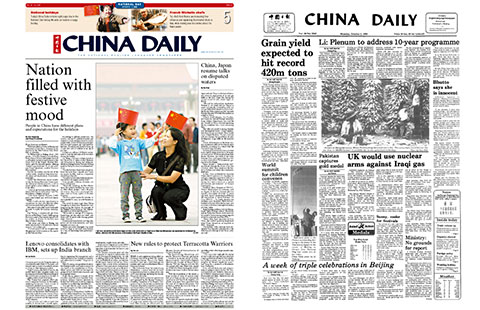Tour bookings show outbound tastes are evolving
By Zhu Wenqian (China Daily) Updated: 2016-10-02 13:34
 |
|
Chinese tourists take a selfie in front of Church of the Savior on Spilled Blood in central St. Petersburg. In the first half of 2016, Chinese people made 59.03 million individual trips abroad, up 4.3 percent yearonyear, according to the China National Tourism Administration. OLGA MALTSEVA / AFP |
With more Chinese seeking diverse experiences overseas, some uncommon destinations are receiving attention, reports Zhu Wenqian
Chinese tourists are increasingly preferring high-quality hotels and memorable experiences when they travel abroad, reflecting their rising purchasing power and evolution of taste, travel agencies said.
For this year's Oct 1-7 National Day holiday, when Chinese tourists' outbound travels peak, prices of overseas travel packages are same as, or slightly cheaper than, last year's.
This year, in addition to traditional tourism hotspots, some exotic destinations have become attractive for Chinese. Those countries or regions include Morocco, the Middle East, East Europe and Sri Lanka, according to several travel agencies.
"Combined with the increasingly sophisticated preferences of Chinese, the National Day holiday is a perfect opportunity for travelers to head to destinations that are not possible to visit during shorter holidays or the Chinese Lunar New Year, which is usually a time for family reunions or other obligations," said Alex Yan, COO of Tuniu Corp, an online travel agency based in Nanjing, Jiangsu province.
Japan, Thailand, Indonesia, the United States, Australia and New Zealand have emerged as the top destinations for Chinese this month. Typically, travelers squeeze in a few days more to have extended vacations like 10-day trips, according to Qyer, a Beijing-based Chinese travel information website.
"Many Chinese travelers choose to take advantage of the long holiday and go to some countries that are relatively far from China. The United States and Oceania countries are preferred by independent visitors, as they are suitable for self-driving travel," said Zhang Qi, vice-president of Qyer.
The number of Chinese who visited the US during this year's National Day rose threefold on the back of the easing of tourist visa procedures.
A report by Lvmama, an online travel service provider, attributed the rise to the fact that China and the US had agreed to grant each other's citizens 10-year multiple-entry visas.
Du Ni, 27, an office worker in Beijing, said she plans to go to Hawaii during the break as she would like to go to a tropical island for vacation, and found that the flight and hotel package of Hawaii seemed cost-effective.
"I'd also like to take this opportunity to apply for a 10-year US visa, so that it would be easier and more convenient for me to go there again in the future," Du said.
Japan, South Korea and some Southeast Asian countries remain popular among Chinese travelers, thanks to their geographical proximity, cheaper packages and favorable visa policies.
In recent months, the Chinese yuan's depreciation against the Japanese yen increased the cost of Japan trips for Chinese travelers. Still, Japan remains one of the hottest destinations for Chinese.
 |
|
Chinese travelers buy local products at a store in Jeju island in South Korea. Jeju is one of the most popular travel destinations for Chinese visitors. WANG GANG / PROVIDED TO CHINA DAILY |
"Tourists travel to a place because they are interested in that place, and they are able to find a package within their budget. While currency exchange rate changes do affect the cost of a trip, their impact is marginal. And tourists intent on visiting a particular country will do so, no matter what," Yan said.
With more and more Chinese travelers seeking diverse experiences overseas, some uncommon destinations are receiving attention.
For instance, Hakone in Japan and Panay Island in the Philippines will host a large number of Chinese tourists during the National Day holiday, according to TripAdvisor, a leading travel review website.
On the other hand, terror attacks in Europe and elsewhere have dented sales of tours to destinations there. In particular, France, Germany and Turkey are expected to receive fewer Chinese travelers in October.
During the May-July period, online searches by users of Qyer for France and Turkey declined sharply year-on-year.
In July alone, sales of Qyer's tours to Turkey tumbled 59 percent year-on-year. But the impact of each new terror attack on travel sales is decreasing.
Although Chinese travelers are turning cautious on certain trips, travel agencies said they are confident that Europe will remain as a popular destination in the long term, given its rich culture and unique travel resources.
In the first half of 2016, Chinese people made 59.03 million individual trips abroad, up 4.3 percent year-on-year, according to the China National Tourism Administration.
Those aged between 25 and 34, followed by those aged between 35 and 44, accounted for about 80 percent of the outbound Chinese tourists. Most of them preferred self-guided or free-and-easy tours, and focused on a few sites rather than visiting a lot of places, a report of the China Tourism Academy said.
Contact the writer at zhuwenqian@chinadaily.com.cn
- Beijing issues air pollution alert
- Leaders mark China's progress
- Telecom scammers will face harsher punitive measures
- Rescuers race against clock to search for the missing
- China, Belarus to enhance ties and mutual relations
- Beijing backs Philippines' war on drug crimes
- Washington, DC, boosting efforts to attract Chinese
- Xi calls for reforms on global governance
- 15 rescued, 26 still missing in East China landslide
- Property to be seized to pay court verdicts











